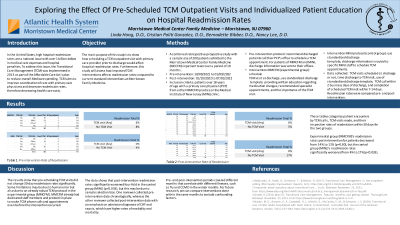Clinical: Efficacy Studies
Exploring scheduled TCM visits and patient education's effect on hospital readmission rates
Friday, March 31, 2023
12:00 PM East Coast USA Time


Linda Hong, DO (she/her/hers)
PGY-3
Morristown Medical Center Family Medicine Residency
Morristown, New Jersey, United States
Presenting Author(s)
Background and Hypothesis: High hospital readmission rates have been a continuing problem nationally. It cost the United States billions of dollars each year in medical care expenses and hospital penalties. To address this issue, the Transitional Care Management (TCM) was implemented in 2013 as part of the Affordable Care Act’s plan to reduce overall Medicare spending. TCM provides services to patients with medical or psychosocial problems requiring moderate to high complexity of care and decision making. TCM aims to improve coordination of care with primary care physicians and decrease readmission rates, therefore decreasing health care costs. This study aims to explore how scheduling a TCM visit with their PCPs prior to discharge affects hospital readmission rates. Furthermore, this study will assess how improved TCM interventions affects readmission rates compared to current standard interventions at Morristown Medical Center Family Medicine Residency.
Methods: The study is a combined retrospective-prospective study with a sample size of 200 patients pre- and post-intervention that were admitted to the Morristown Medical Center Family Medicine inpatient team over a period of 10 months. The inclusion criteria is patients over 18 years of age with a primary care physician from either Morristown Medical Center Family Medicine (MMCFM) practice or the Medical Institute of New Jersey (MINJ) clinic.
The practice prior to intervention was to recommend the discharged patients to call their PCP’s office to schedule an appointment. For patients of MMCFM and MINJ, discharge information was sent to their offices, and TCM appointments were dependent on office staff to schedule.
This study’s intervention schedules a TCM visit before a MMCFM patient’s discharge, uses a standardized template in discharge paperwork providing written education regarding medication changes, recommended specialist appointments, and the importance of the TCM visit. The same standardized template applies to MINJ patients. However, instead of scheduled TCM visits, discharge information is routed to specific MINJ staff to schedule TCM appointments.
We will analyze whether TCM visits were made prior to patient’s discharge, the length of time post discharge to TCM visit, whether the standardized template was used, whether TCM call was made within 2 business days of discharge, and whether patient completed the scheduled TCM visit within 7-14 days. We will then compare readmission rates before and after intervention, specifically concentrating on patients with diagnoses of CHF and sepsis.
Results: Pending completion of chart review and statistical analysis.
Conclusion: Studies show TCM visits are pivotal on reducing readmissions. However, its effectiveness is highly dependent on specific interventions implemented to encourage patient compliance, resulting in persistently high readmission rates in patients with heart failure, pneumonia, ACS, sepsis, and chronic kidney disease. Rates also depend on variability within different hospital systems and even among different hospital teams within the same system. Specific interventions have more significant effects in reduction of readmissions, but the types of interventions are limited by available resources. This study focuses on improving TCM implementation and patient education through standardized protocols and scheduled TCM visits prior to discharge.
Acknowledgement of Research Study Sponsors and IRB: Drs. Jonathan Torres and Nancy Lee
Pending IRB approval
Methods: The study is a combined retrospective-prospective study with a sample size of 200 patients pre- and post-intervention that were admitted to the Morristown Medical Center Family Medicine inpatient team over a period of 10 months. The inclusion criteria is patients over 18 years of age with a primary care physician from either Morristown Medical Center Family Medicine (MMCFM) practice or the Medical Institute of New Jersey (MINJ) clinic.
The practice prior to intervention was to recommend the discharged patients to call their PCP’s office to schedule an appointment. For patients of MMCFM and MINJ, discharge information was sent to their offices, and TCM appointments were dependent on office staff to schedule.
This study’s intervention schedules a TCM visit before a MMCFM patient’s discharge, uses a standardized template in discharge paperwork providing written education regarding medication changes, recommended specialist appointments, and the importance of the TCM visit. The same standardized template applies to MINJ patients. However, instead of scheduled TCM visits, discharge information is routed to specific MINJ staff to schedule TCM appointments.
We will analyze whether TCM visits were made prior to patient’s discharge, the length of time post discharge to TCM visit, whether the standardized template was used, whether TCM call was made within 2 business days of discharge, and whether patient completed the scheduled TCM visit within 7-14 days. We will then compare readmission rates before and after intervention, specifically concentrating on patients with diagnoses of CHF and sepsis.
Results: Pending completion of chart review and statistical analysis.
Conclusion: Studies show TCM visits are pivotal on reducing readmissions. However, its effectiveness is highly dependent on specific interventions implemented to encourage patient compliance, resulting in persistently high readmission rates in patients with heart failure, pneumonia, ACS, sepsis, and chronic kidney disease. Rates also depend on variability within different hospital systems and even among different hospital teams within the same system. Specific interventions have more significant effects in reduction of readmissions, but the types of interventions are limited by available resources. This study focuses on improving TCM implementation and patient education through standardized protocols and scheduled TCM visits prior to discharge.
Acknowledgement of Research Study Sponsors and IRB: Drs. Jonathan Torres and Nancy Lee
Pending IRB approval
